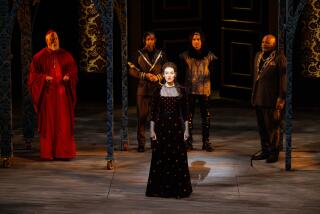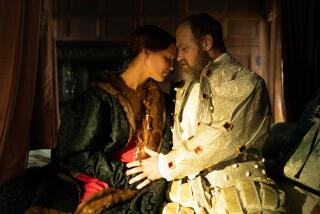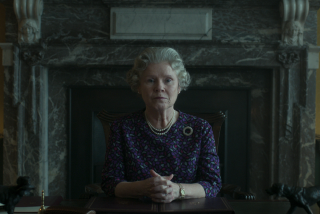‘Tudors’ should spill some blood
- Share via
On the first season of “The Tudors,” characters by and large came alive only when some sort of bodily fluid was involved.
King Henry VIII (Jonathan Rhys Meyers) moved with purpose when he feared he’d come down with the dreaded “sweating sickness.” At the trial to determine whether Henry could divorce his wife, Katherine of Aragon (Maria Doyle Kennedy), someone volunteered to produce the bloody linens from the conjugal bed she shared with her first husband, Henry’s older brother Arthur. And the season finale opened with Henry violently masturbating into a towel held by a servant and concluded with the near consummation of his affair with Anne Boleyn, which she forcibly interrupted just before the deed was completed.
In essence, the humors of the body were substitutes for actual feeling. Certainly, “The Tudors,” which begins its second season tonight (Showtime, 9), is dense viewing -- there’s a great deal of talking, in florid language, and carefully executed production and costume design. But for all its finery, “The Tudors” is strangely blank. In the literal sense, it is an easy show to get lost in.
The second season opens while Henry is still in the midst of his divorce struggle -- the King’s “great matter,” it is delicately called. He has openly taken up with Boleyn (Natalie Dormer), who offers the king two things no other woman has: the promise of a son and the willingness to hold out on the act that would create one.
In Season 1, Henry and his friends were cads, sleeping their way through court. There is some glimmer of growth this season, but really, putting sex off is not that radically different than sex itself. As an actor, Meyers need shift only from aroused to frustrated, not a great emotional leap.
Last season, his best friend, Charles Brandon (Henry Cavill), was an enthusiastic sidekick to the king’s games. Now married, he’s begun thinking, which doesn’t suit him particularly well. Despite all the talk of Reformation, prelates and succession, “The Tudors” most resembles another show about sex and power among warring tribes: “Gossip Girl.”
Not coincidentally, it is at its best when it is at its most louche. The formation of the Church of England and the concurrent frictions with the Vatican may make for great historical narrative, but it is milked here largely for long conversations. Sir Thomas More (Jeremy Northam), the anti-reform advisor to the king, is portrayed as out of touch and even a bit simple. His new adversary, Thomas Cromwell (James Frain), is a better manipulator than he is but still radiates little charm.
Much is communicated with visuals -- “The Tudors” engages the eye far more than the ear, thanks to elaborate costumes (by Joan Bergin) and sharp sets (by Tom Conroy). Read generously, the visual spectacle is a metaphor for the hollow foundation upon which so many crucial decisions were made. It masks weakness.
Still, there are lessons to be gleaned from “The Tudors.” It makes a profound argument in favor of the separation of church and state; and separation of state and bed.
“In that time, sex was very, very important,” Meyers recently told New York magazine. “Sex changed nations.” Given the preponderance of royal intermarriage, to say nothing of the seeming ease of affairs, the unmaking of empires seems quite fickle, a lesson that strikes a familiar note.
Because “The Tudors” is, largely, historically accurate, there is little mystery as to what will unfold this season -- Henry will tire of Boleyn and, after she provides him with a daughter, not the son he craved, and after he meets Jane Seymour, Henry will have Boleyn and her loyalists beheaded. Thankfully, and finally, there will be blood.
More to Read
The complete guide to home viewing
Get Screen Gab for everything about the TV shows and streaming movies everyone’s talking about.
You may occasionally receive promotional content from the Los Angeles Times.






